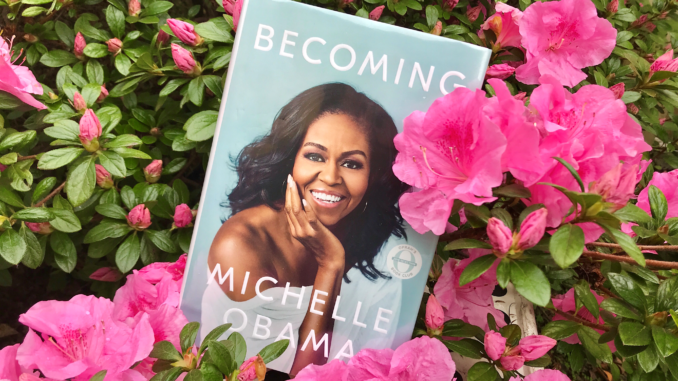
Before Barack was president, Michelle shared her frustration with Barack’s absence, as she worked and raised their daughters alone. For this she was branded an angry black woman. But any wife can relate to the isolation and resentment of shelving her career to prioritize her husband’s. She was in the midst of struggle and uncertainty, so of course she sounded upset.
Now, Michelle looks back with calm perspective from her pinnacle. We learn how she developed such focus and fortitude.
Here, Michelle admits that even a formidable female like her struggles just like us. She grew up fully aware of her grandfathers’ limited job options due to race. She knew she had to prove herself every time. She questioned whether she was good enough. She sought people’s approval.
“Everyone seemed to fit in, except for me. I…recognize the more universal challenge of squaring who you are with where you come from and where you want to go.”
All the while, she had her family’s constancy and her outstanding mother’s devotion.
“My mother maintained the sort of parental mind-set that I now recognize as brilliant and nearly impossible to emulate—a kind of unflappable Zen neutrality….My mom was even-keeled. She wasn’t quick to judge and she wasn’t quick to meddle.” She told Craig, “Handle it how you think best.”
At Princeton, she earlier shared her feelings of isolation as one of a handful of non-white students. “[A]t Princeton, I was representing my race.” Now, she focuses on her lifelong friendships, her experience caring for kids, and finding a mentor.
As a big-time lawyer, she wrestled with her ambition and search for meaningful work.
“I felt empty doing it, even if I was plenty good at it. This was a distressing thing to admit, given how hard I’d worked and how in debt I was. In my blinding drive to excel, in my need to do things perfectly, I’d missed the signs and taken the wrong road.”
So she swerved into another path, into nonprofit.
“[T]he next phase of my journey would not simply unfold on its own, that my fancy academic degrees weren’t going to automatically lead me to fulfilling work….It required deeper thought and effort.”
Then she acceded to Barack’s aspirations to serve, which compromised her need for his presence and their privacy. Michelle did not want to be embroiled in the nastiness of politics. She was attacked as an outsider.
“I felt as if I couldn’t win, that no amount of faith or hard work would push me past my detractors and their attempts to invalidate me. I was female, black, and strong, which to certain people…translated only to “angry.” It was another damaging cliché, one that’s been forever used to sweep minority women to the perimeter of every room, an unconscious signal not to listen to what we’ve got to say.” It hurt.
How can she rise above pettiness? “Even if we didn’t know the context, we were instructed to remember that context existed. Everyone on earth…was carrying around an unseen history, and that alone deserved some tolerance.”
“I focused on making personal connections with the people I met….When voters see me as a person, they understood that the caricatures were untrue. I’ve learned that it’s harder to hate up close.”
We learn the pains required of woman to measure up to public scrutiny; expected to “provide more lightness, more fluff”, a standard no man endures.
Michelle shared a miscarriage, how she strived to get pregnant, maternal worries, the myth of part-time work, childcare woes, finding mentors, her mistakes, and how she tried to balance her career and personal life.
She even went into marriage therapy. “I understand now that even a happy marriage can be a vexation, that it’s a contract best renewed and renewed again, even quietly and privately—even alone.”
Michelle shares her story so we can learn from her mindset and choices. It hasn’t been easy. Yet she makes it look effortless and deliberate.
Michelle is a woman who redefined what it means to be a First Lady.
She is first in many unique ways. A black professional who danced and sang carpool karaoke on late night TV, greeted girls with a hug, and touched Queen Elizabeth’s shoulder. She opened up the White House to the people and warmed it up with gardening, diversity, art, music, and children.
She is a lady held in the highest regard. As she learned to close off criticism, she opened her heart to the needy and hurt. She used her position
to show us the healing power of hope, generosity, and compassion. Hers is an aspirational reputation— honorable, accomplished, and gracious.
“I intended to arrive at the White House with a carefully thought-out strategy and a strong team backing me. If I’d learned anything from the ugliness of the campaign, from the myriad ways people had sought to write me off as angry or unbecoming, it was that public judgment sweeps in to fill any void. If you don’t get out there and define yourself, you’ll be quickly and inaccurately defined by others.”
She’s not yet done. She is still in the process of Becoming.
